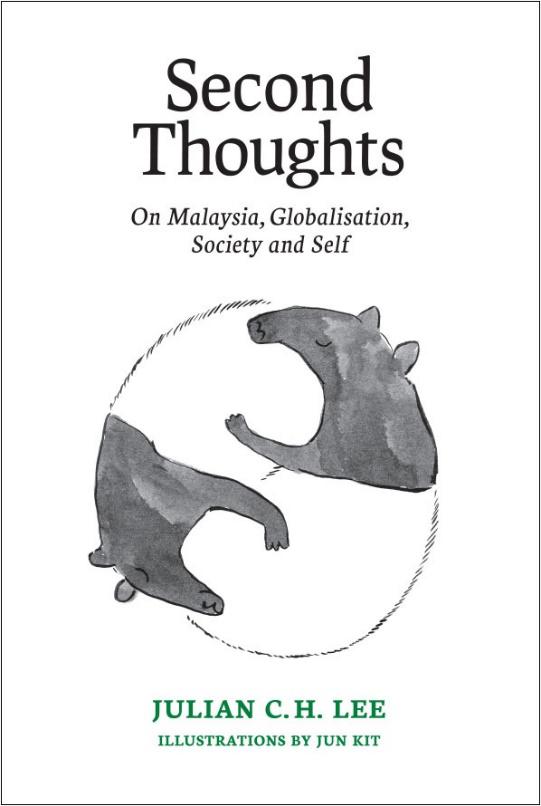- Views4078
- Likes0
Second Thoughts: On Malaysia, Globalisation, Society and Self
by Julian C. H. Lee
Review by Senigala
It isn’t every day you receive a book with two tapirs enveloping one another in a yinyang motion on the cover, playing with the cyclic notion of contrary elements complementing one another, embracing their similarities. Published by Strategic Information and Research Development Centre (SIRD) Malaysia, Second Thoughts is written by Julian C.H. Lee, a senior lecturer in Global Studies at RMIT University), who is known for his research in society, gender, sexuality and multiculturalism. Lee’s writings are mostly academic in nature, but Second Thoughts’ curation and presentation seems to resonate from his book The Malaysian Way of Life: Perspectives of a Nation’s Culture and Politics (2009). Alongside complementary and humble illustrations done by relaxed graphic designer Jun Kit, Lee’s treatment for the book is as light-hearted as Jun Kit’s humorous illustrations, although he deals with the weighty themes of Malaysia, Globalisation, Society and Self.
The introduction, on the idea of second thoughts, slowly familiarizes the reader with how the book proposes you should consume the brain candies in its 196 pages. Words like ‘reassessment,’ ‘reconsider,’ ‘ways of seeing,’ and ‘pause occasionally and contemplate’ emerge and frame the reading. The main section of the book, which is a collection of Lee’s essays, reviews and academic articles previously published in Jom, Off the Edge, The B-Side and elsewhere, is preceded by some helpful advice:
“The reader shouldn’t feel as though the book should be read in order.”
The book is categorized into six sections, beginning with ‘Concerning Malaysia’, which takes a sociological approach in reflecting on political transformations in 21st century Malaysia. From sub topics like ‘the day Malaysia woke up’ which discusses the 2008 election results, and the idea of the public sphere and its enhancement for improved democracy, to ‘Intergroup relations’ which is broken down into four parts and discusses the many ways the diverse groups take shape and interact with one another. We see Julian’s concerns about Malaysia, allowing the reader to identify the many actors driving its growth and its current stature.
In the second section, ‘Making the Connections – Malaysia (ns) in the world,’ Lee attempts to identify the effects Malaysia and Malaysians have in the culturally globalized world. Drawing insights from Gangnam-style parodies in Malaysia, the commonalities between Malaysia and Australia (where Lee is also academically active), Malaysia’s reaction to the 2011 Fukushima disaster through the lenses of Hokusai’s The Great Wave, and the post-traumatic reactions to MH370, we see the different layers of Malaysia’s popularity around the world.
‘Thinking through the world,’ the third section, takes a more individualistic angle on popular culture. In this section (which has a less serious tone), Lee dwells upon everyday interactions with people, the act of gossiping, paraphernalia (a review), experiencing time, gender roles in popular films, and (my personal favourite, as I’m interested in the manifestation of the feminist lexicon): ‘Womyn’, an attention to the linguistics of gender and the creation and biases of words and terminologies. Although this section felt more haphazard than previous topics, it’s definitely a fun read, and a positive build up for the rest of the book.

In the following fourth section, ‘Traffic,’ things became a little bit drier, as the discussion shifts to automobiles. The most interesting of the four articles in this section is the reflection upon the science of traffic, especially the theoretical relationship between driver quality and levels of corruption which has been effectively reduced by more women traffic officers in Mexico. What follows next are Lee’s reviews about an Alfa Romeo model (which makes his marriage in Batu Pahat possible), and the art of the car sale, which warns of how car dealers convince you to buy their cars instead of that of your own choosing.
Even as the writer admits he isn’t a professional reviewer of wines and cars, these reviews are still a window into understanding consumerism and its love-hate relationship with daily life, which is clearly seen in the fifth section, ‘Consumption’. Although it primarily deals with food (oranges and pineapples, kiwifruit, tempeh, and Hainanese chicken rice) and alcoholic beverages (whiskey and wine), Lee gives beautiful insights into how the history of consumables creates a long-lasting culture of everyday consumption, and are at times used to refer to/create/compare group identities.
After enough food and drink, the reader is led into a more philosophical realm, under the title ‘Received Wisdom and other probable errors.’ In this section, Lee begins by highlighting how Buddhist ideas of ‘suffering’ were picked up by Arthur Schopenhauer during the nineteenth century. He goes on to explore the philosopher’s concepts of pessimism, and the use of humour to counter the ugly truth of being. Lee feeds on the following articles like soul pancakes, as the discussion flows into alternate ways of living and shaping new outlooks in shuffling interests, preaching to the converted as a form of reaffirming one’s self, and how to look beyond passions and reflect on ‘how’ we are, rather than ‘who’ – an interesting mirror on the author’s beliefs and practice.
Having a go at this book in one day wasn’t a bad idea, but it did prove challenging. The articles can seem jarringly unrelated at times, and the layering of ideas haphazard (thank God for the section titles). Hence, the advice issued in the introduction is worth considering. Overall, Second Thoughts may play an interesting role in mapping and considering the unseen forces that shape our national consciousness and the negotiations of popular perceptions in the world around us. It is a fruitful and accessible must-read for those who seek an introduction to the sociological ecosystem of Malaysia and Malaysians at home (and overseas) in a more socially globalized ‘today’.
Senigala is one of The 2020s, a group of young writers at Critics Republic.
